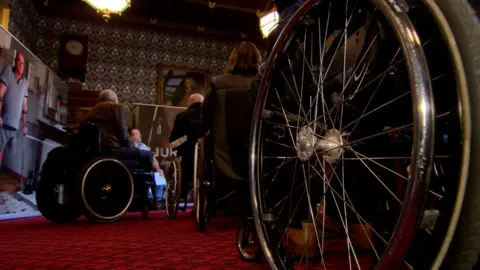Troubles pension: Criteria for ex-prisoners to receive settlements revealed
 BBC
BBCDetails which may allow some former prisoners to receive a Troubles pension but block others have been obtained by the BBC.
They are set out in the three-page "confidential" draft guidelines circulated to all the Stormont parties.
The document also details the "guiding principles" the judge-led panel should use when assessing applications from those with a "relevant conviction".
These are "generally convictions carrying longer than 30 months".
They apply to the most "serious crimes such as murder, actual bodily harm etc", the paper states.
Under the guidelines, an application can also be rejected if the president of the board decides the "exceptional circumstances of the case having regard to material evidence" makes payment inappropriate.
That evidence includes
- Recent terrorist activity as evidenced by the applicant being convicted of a Terrorism Act Offence
- The applicant being a registered terrorist offender
- Having a recent conviction for membership of a proscribed organisation
- If the person caused wholly or in part the incident in which they were injured as evidenced by a case or action proven to a civil standard
Sinn Féin says the guidelines go beyond what is in the legislation and argues they discriminate against former prisoners who were injured during the Troubles.
But the Northern Ireland Office disagrees and, along with the DUP, has accused Sinn Féin of blocking the pension payments by refusing to nominate the Justice Department to oversee the scheme.
Applications for payments to victims of between £2,000 and £10,000 had been due to commence on 29 May.
The draft guidelines also set out the following test which the panel must use when deciding if a former prisoner qualifies for a pension.
"Is the serious nature of the relevant conviction outweighed by mitigating circumstances and relevant factors"?
The mitigating factors to be considered include:
- Where the applicant demonstrates remorse and/or has sought restitution or to make positive contribution to society since the time of that conviction;
- If the offence was committed when the applicant was a juvenile;
- If a medical adviser appointed by the panel considers that psychological trauma caused by the Troubles may have contributed to subsequent offences;
- The vulnerability of the individual due to mental of physical incapacity or brain injury
However, the draft guidelines also make it clear that "where there is continuing disregard for the law as evidenced by recent convictions for offences other than minor ones, entitlement would be inappropriate".
 Pacemaker
PacemakerThe Ulster Unionists, SDLP and Alliance have called for the payment scheme to be implemented immediately.
Victims Commissioner Judith Thompson has called the current political stand-off "shameful".
There is also gridlock over whether London or Stormont pays for the scheme which is estimated to cost much more than the £100m stated.
Speaking on Sunday Politics, Shadow Northern Ireland Secretary Louise Haigh said Westminster should pay for the first year.
She said: "With everything else they are coping with at the moment in response to Covid and the economic recovery, I don't think it would be right or reasonable to ask Stormont to fund this in the first year
"The liability drops significantly after the first year to something like £5m a year, so I think those ongoing costs could be funded by Stormont.
"But in order to break the logjam and get this going, Westminster needs to step in and fund the scheme."
